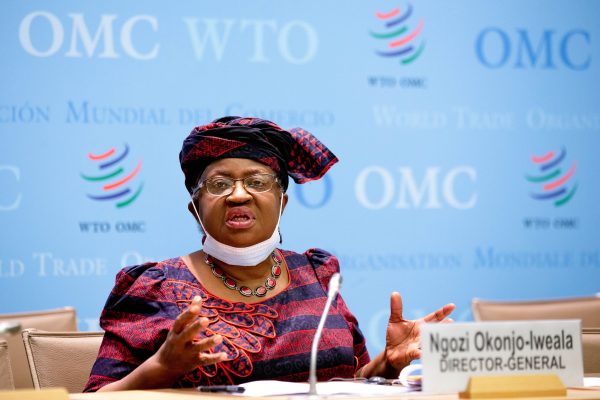Ordinarily occurring every two years, MC12 has taken four, delayed first by the wise decision to avoid the Kazakh winter, then by the pandemic.
A worldwide trend towards discriminatory and protectionist measures has continued in the meantime. Development, business, consumers and investors have suffered as trade has become less predictable, less liberalised and easier to weaponise around political objectives.
The United States, once the self-identifying champion of the rules-based order, was an antagonistic force at the WTO for four years under the Trump administration. President Joe Biden has somewhat improved the tone, but the US position is still one of extreme scepticism toward the international trading system. With the United States yet to even confirm a WTO ambassador, few expect US leadership at MC12. Fewer still expect it to offer concessions to get multilateral deals over the line or end the Appellate Body appointments blockade.
Chinese President Xi Jinping’s 2017 Davos address was interpreted by many as a sign that China was about to step up to global trade leadership. This has largely not materialised — made unlikely by China’s position that its WTO accession commitments represent the full extent of liberalisation it should be expected to make, and by its suspicion toward WTO reform conversations centred on new disciplines on state capitalism.
The European Union is likely to advocate for progress in areas such as the environment, gender and climate change. It is also a key player in many plurilateral initiatives. However, a bloc of 27 will always struggle to maintain the flexibility and agility shepherding multilateral negotiations to conclusion requires.
The election of Ngozi Okonjo-Iweala as WTO director-general has sparked hope that her drive, energy and star power might kickstart a renaissance — expectations she has tried to manage. She has been relentlessly active on a number of fronts, and a reform of the WTO Secretariat is in progress. Yet her authority is severely limited and can’t replace genuine engagement from members.
In the absence of leadership from major players or movement on central WTO mandate issues, it has fallen to middle powers to try to energise momentum in other areas.
Commendable efforts by the Australia-convened Cairns Group has seen dialogue on the agricultural domestic subsidy reform project, a key issue of contention since the Doha round. But still there seems little chance of progress here. An outcome would require significant commitments on subsidy limits from the United States and the European Union, at least tokenistic liberalisation from India and China, and either exemptions for or significant changes by small yet committed subsidisers like Switzerland and Norway.
Talks on disciplining subsidies for harmful fishing practices are contentious but advancing, and a modest landing zone could emerge at MC12.
Plurilateral progress could also surface at MC12 in areas like e-commerce, investment facilitation and services domestic regulation. Soft law plurilateral initiatives that relate to gender or micro, small and medium enterprises could also advance given they are relatively inoffensive and do not create binding trade rules. Yet these plurilateral negotiations, while progressing, are still controversial.
Embraced to varying degrees by most members, the lack of consensus inherent in the plurilateral process is being denounced by some as contrary to the spirit of the WTO. Should any sub-group negotiations bear fruit, India, South Africa and other opponents are likely to sour any potential victory, if moves like a refusal to extend the e-commerce moratorium don’t do so.
The WTO is under pressure to deliver consensus outcomes related to COVID-19 pandemic management and recovery. A proposed TRIPS waiver for COVID-19-related goods would free governments from international obligations to protect patents on vaccines and other medical goods. Sparking heated debate about its usefulness, the proposal by India and South Africa has gained global traction including in-principle US support. Some speculate a deal could be reached by the conference or sooner.
Despite US backing, a deal could be elusive. The United States and others have signalled concerns with its duration and breadth, and revised proposals have not yet addressed the issues. The European Union has withheld support, instead tabling a counter-proposal keeping intellectual property protections in place and instead making compulsory licensing provisions already in the TRIPS agreement easier to use.
Okonjo-Iweala is likely to push for some kind of WTO health outcome regardless. Her approach to dealing with the waiver thus far reveals her type of leadership. Rather than taking sides or stepping back with a non-committal ‘it’s in the hands of the members’ response, she has opted for a different approach.
She has used the convening power of the WTO to bring together pharmaceutical companies, governments and intergovernmental organisations to foster coordinated action toward accelerated vaccine production and distribution.
MC12 has the potential to bring more such innovative convening experiments. Shaping outcomes to tackle the pressing challenges the world faces today requires coordinated action between governments, organisations, investors, business and consumers.
With WTO members unable to provide the leadership or compromises for rulemaking, the WTO itself could wield its enormous soft power to effect change by leveraging its reputation for neutrality, its highly qualified secretariat, and the Director-General’s tremendous convening power and energy. It may have to for MC12 to be a success.
Dmitry Grozoubinski is Executive Director of the Geneva Trade Platform in the Centre for Trade and Economic Integration at the Graduate Institute of International and Development Studies (IHEID), Geneva. He is Editor of WTO Plurilaterals, a new online resource for information about plurilateral negotiations at the WTO.

